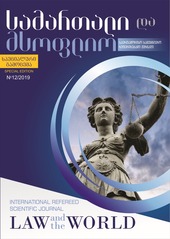FEATURES OF PROTECTING THE PATIENT’S PERSONAL AUTONOMY AND OF GIVING INFORMED CONSENT (Georgian and European approaches) 
##plugins.themes.bootstrap3.article.main##
Abstract
Protecting patients’ personal autonomy is one of the most pressing issues in medicine as well as in law. In this sense, the aim of the study is to determine the essence of the patient’s personal autonomy and the legal consequences of infringement in personal interests. It is particularly interesting to determine the characteristics of informed consent by analyzing Georgian and European approaches. Furthermore, it is important to study medical secrets.
It seems that ensuring a patient’s personal autonomy is based on the respect towards an individual and the rules on giving informed consent. It turned out that informed consent should be voluntarily issued before medical intervention, be understood and provided in a simple language for the patient. Georgia has to consider a well-accepted approach in Europe that informed consent is seen as a component of respect for private life, while medical intervention without a consent of patient constitutes a violation of the private life. Exceptions might exist, such as - emergency situations.
However, it was found that it is advisable to use the term “medical secrets” instead of the term “doctoral secrets” in order to protect the personal interests of the patient and to avoid narrowing the circle of those responsible for.
According to the research, the lack of informed consent can cause both material and non-material damage. It is particularly important to avoid non-determination of health and causing non-material damage during medical interventions without
informed consent. It is recommended to extend the provisions of Article 413 of the Civil Code of Georgia to this case. Additionally, if personal virtues (dignity, privacy, etc.) have been violated while breaching a patient’s personal autonomy, the rules
set forth in Article 18 of the Civil Code should apply.






 https://orcid.org/0000-0003-2297-0326
https://orcid.org/0000-0003-2297-0326
